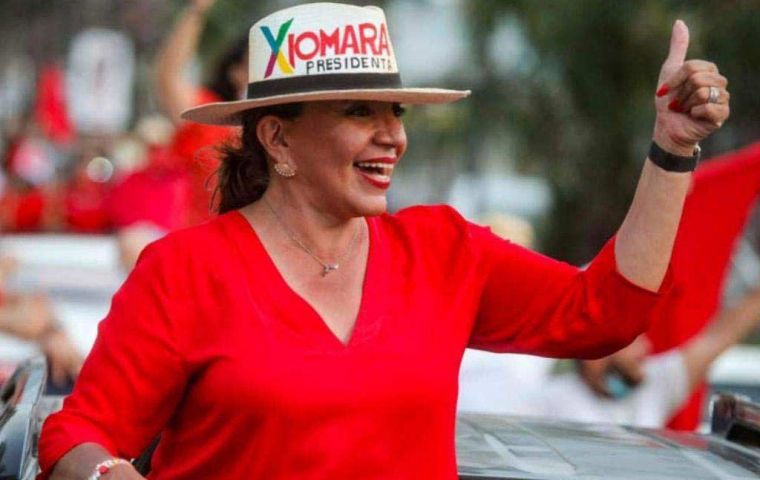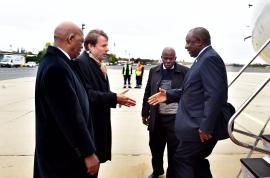
TEGUCIGALPA, Nov 30 (NNN-MERCOPRESS) — Chavist candidate Xiomara Castro seemed on track Monday morning to become the first female president of Honduras after 38.94% of the votes had been counted.
Castro, a former first lady whose husband Manuel Zelaya was ousted by a coup in 2009, had obtained 53.44% of the votes, according to the National Electoral Council (CNE), after Sunday’s elections.
The candidate of the ruling National Party, Nasry Asfura, lagged behind, with 34.04% of the votes and way behind came Yani Rosenthal, of the opposition Liberal Party, with 9.19%.
Castro had 750,093 votes, Asfura 477,320 and Rosenthal 128,990, according to the official report. Despite these preliminary announcements, the CNE has 30 days to publish the final results.
Castro, 62, would be the first woman in Honduran history to become Head of State. She heads the coalition of Libertad y Refundación (LIBRE) with the National Opposition Union of Honduras (UNOH). The National Party has ruled for the last twelve years.
Zelaya was ousted on June 28, 2009 when he tried to promote constitutional reforms that were reportedly against the law. Castro made a name for herself when she took to the streets to demand the reinstatement of her husband. She failed, but gained many adherents in the process, thus forming the LIBRE party under which she lost the 2013 elections to Juan Orlando Hernández of the National Party, although Castro alleged that the elections had been stolen from her through “fraud.”
Castro was going to run again in 2017, but she finally let the leader of the Anti-Corruption Party (PAC) Salvador Nasralla top the ticket of the Opposition Alliance against the Dictatorship. Hernández was reelected, although reelection was not possible under the Honduran constitution.
The Zelaya-Castro couple is, in fact, linked to the Government of Venezuela since, in 2007, Honduras joined Petrocaribe, the oil alliance between Caribbean countries created by then-President Hugo Chávez. Since 2009, Zelaya has been chief coordinator of the political council “for the defense of independence and democracy” of Petrocaribe. Venezuelan President Nicolás Maduro already congratulated Castro on her victory early Monday, it was reported.
There is no presidential runoff under Honduran law. Therefore, whoever gets the most votes becomes president and would take office Jan. 27, 2022.
Exit polls also confirmed Castro’s victory with between 48 and 51% of the vote.
The elections, in which 14 parties and 12 presidential candidates participated, were monitored by more than 400 special envoys from the European Union, the OAS, the Inter-American Union of Electoral Organizations (Uniore), former Latin American presidents, and missions from several different countries.
During election day, some irregularities were denounced, such as the collapse of the CNE website, the temporary closure of at least one voting center, presumably marked votes and a delay in the opening of various polling stations. But despite all these events, the elections were relatively quiet in a country mired in political violence, constant migration, and growing poverty.
Last year there were at least 30 politically motivated murders, followed by accusations of corruption and drug trafficking involving even the incumbent President Hernández.
In addition to Honduras, the left has won the last elections in Nicaragua (Daniel Ortega) and Venezuela (regional authorities). Also a favorite is Gabriel Boric to win Chile’s second presidential round next month and Lula has a clear advantage over Jair Bolsonaro in Brazil for next year. — NNN-MERCOPRESS




